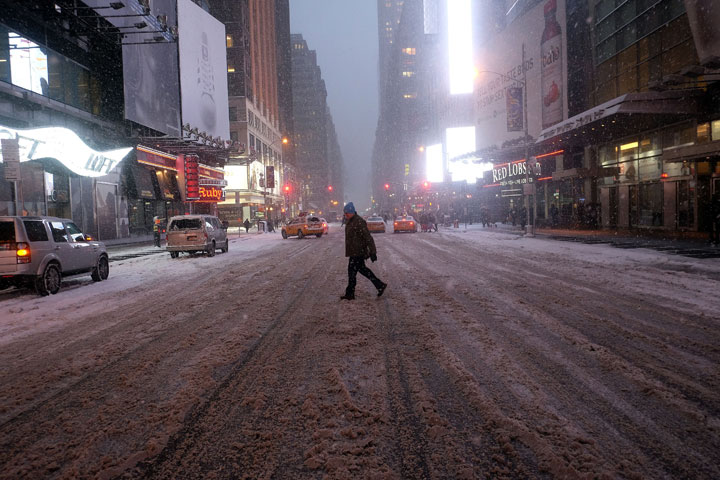BOSTON – New Englanders savaged by a blizzard packing knee-high snowfall and hurricane-force winds began digging out as New Yorkers and others spared its full fury questioned whether forecasts were overblown.

The storm buried the Boston area in more than 2 feet of snow and lashed it with howling winds that exceeded 70 mph. It punched a gaping hole in a seawall and swamped a vacant home in Marshfield, Massachusetts, and flipped a 110-foot replica of a Revolutionary War ship in Newport, Rhode Island, snapping its mast and puncturing its hull.
“I had to jump out the window because the door only opens one way,” Chuck Beliveau said in the hard-hit central Massachusetts town of Westborough. “I felt like a kid again. When I was a kid, we’d burrow through snow drifts like moles.”
But signs of normalcy emerged: Boston’s public transit was running Wednesday, and Amtrak trains to New York and Washington were rolling on a limited schedule. Flights were to resume at about 8 a.m. Wednesday at Logan International Airport, among the nation’s busiest air hubs,
Bitter cold threatened to complicate efforts to clear clogged streets and restore power to more than 15,000 customers shivering in the dark, including the entire island of Nantucket. A 78 mph wind gust was reported there, and a 72 mph one on neighbouring Martha’s Vineyard.
The low in Boston on Wednesday was expected to be 10 degrees, with a wind chill of minus 5. Forecasters warned that it won’t get above freezing for a week.
The Philadelphia-to-Boston corridor of more than 35 million people had braced for a paralyzing blast Monday evening and into Tuesday after forecasters warned of a storm of potentially historic proportions.
The weather lived up to its billing in New England and on New York’s Long Island, which also got clobbered.

Get breaking National news
In the New York City area, the snowfall wasn’t all that bad, falling short of a foot. By Tuesday morning, buses and subways were starting to run again, and driving bans there and in New Jersey had been lifted.
The glancing blow left forecasters apologizing and politicians defending their near-total shutdown on travel. Some commuters grumbled, but others sounded a better-safe-than-sorry note and even expressed sympathy for the weathermen.
National Weather Service director Louis Uccellini said his agency should have done a better job of communicating the uncertainty in its forecast. But he also said the storm may in fact prove to be one of the biggest ever in some parts of Massachusetts.
Around New England, snowplows struggled to keep up, and Boston police drove several dozen doctors and nurses to work at hospitals. Snow blanketed Boston Common, where the Redcoats drilled during the Revolution, and drifts piled up against Faneuil Hall, where Samuel Adams agitated for rebellion against the British.
More than 24 inches of snow coated Boston’s Logan Airport, the sixth-highest in recorded history. The record is 27.6 inches in 2003. Worcester got 33.5 inches — the highest amount recorded since 1905 — and Auburn and Lunenburg each reported 36 inches.
Burrillville, Rhode Island, got 26.5 inches. More than 20 inches piled up in Portland, Maine, and 33.5 inches in Thompson, Connecticut. Orient, on the eastern end of Long Island, got about 30 inches.
Two deaths, both on Long Island, were tied to the storm by police: a 17-year-old who crashed into a light pole while snow-tubing down a street and an 83-year-old man with dementia who was found dead in his backyard.
While Philadelphia, New York and New Jersey had been warned they could get 1 to 2 feet of snow, New York City received just under 10 inches and Philadelphia a mere inch or so. New Jersey got up to 10 inches.
National Weather Service forecaster Gary Szatkowski, of Mount Holly, New Jersey, tweeted an apology: “You made a lot of tough decisions expecting us to get it right, and we didn’t.”
New Jersey Gov. Chris Christie defended his statewide ban on travel as “absolutely the right decision to make,” given the dire forecast. New York Mayor Bill de Blasio said the city will look at whether storm procedures could be improved but added: “You can’t be a Monday morning quarterback on something like the weather.”
The blizzard posed a test for Massachusetts Gov. Charlie Baker, who took office three weeks ago, and Boston Mayor Martin J. Walsh, who just finished his first year in office.
With the storm drawing near, the governor banned all non-essential travel, and the mayor ordered city schools closed for two days.
“So far, so good,” Tufts University political science professor Jeffrey Berry said. “What’s important for a governor or a mayor is to appear to be in charge and to have a plan to finish up the job and to get the city and the state back to work.”
___
Associated Press writers Patrick Whittle in Portland, Maine; Michelle R. Smith in Providence; Rhode Island; Steve LeBlanc and Sylvia Lee Wingfield in Boston; Amy Crawford in Westborough, Massachusetts; Pat Eaton-Robb in Columbia, Connecticut; Jennifer Peltz, Kiley Armstrong, Ula Ilnytzky and Verena Dobnik in New York; Shawn Marsh in Trenton, New Jersey; Jill Colvin in Jersey City, New Jersey; Geoff Mulvihill in Haddonfield, New Jersey; and Sean Carlin, Michael Sisak and Kathy Matheson in Philadelphia contributed to this report.





Comments